Organisational Behaviour: Influence of Culture, Politics, and Motivation on Team Performance
VerifiedAdded on 2023/06/17
|12
|3749
|379
AI Summary
This report explores the impact of organisational culture, politics, and motivation on team performance in Unilever. It discusses effective team characteristics and the difference between effective and ineffective teams. It also covers content and process theories of motivation. The report is based on Unit 12 Organisational Behaviour and includes a critical analysis of Maslow's Hierarchy of Needs and Vroom's Expectancy Theory.
Contribute Materials
Your contribution can guide someone’s learning journey. Share your
documents today.
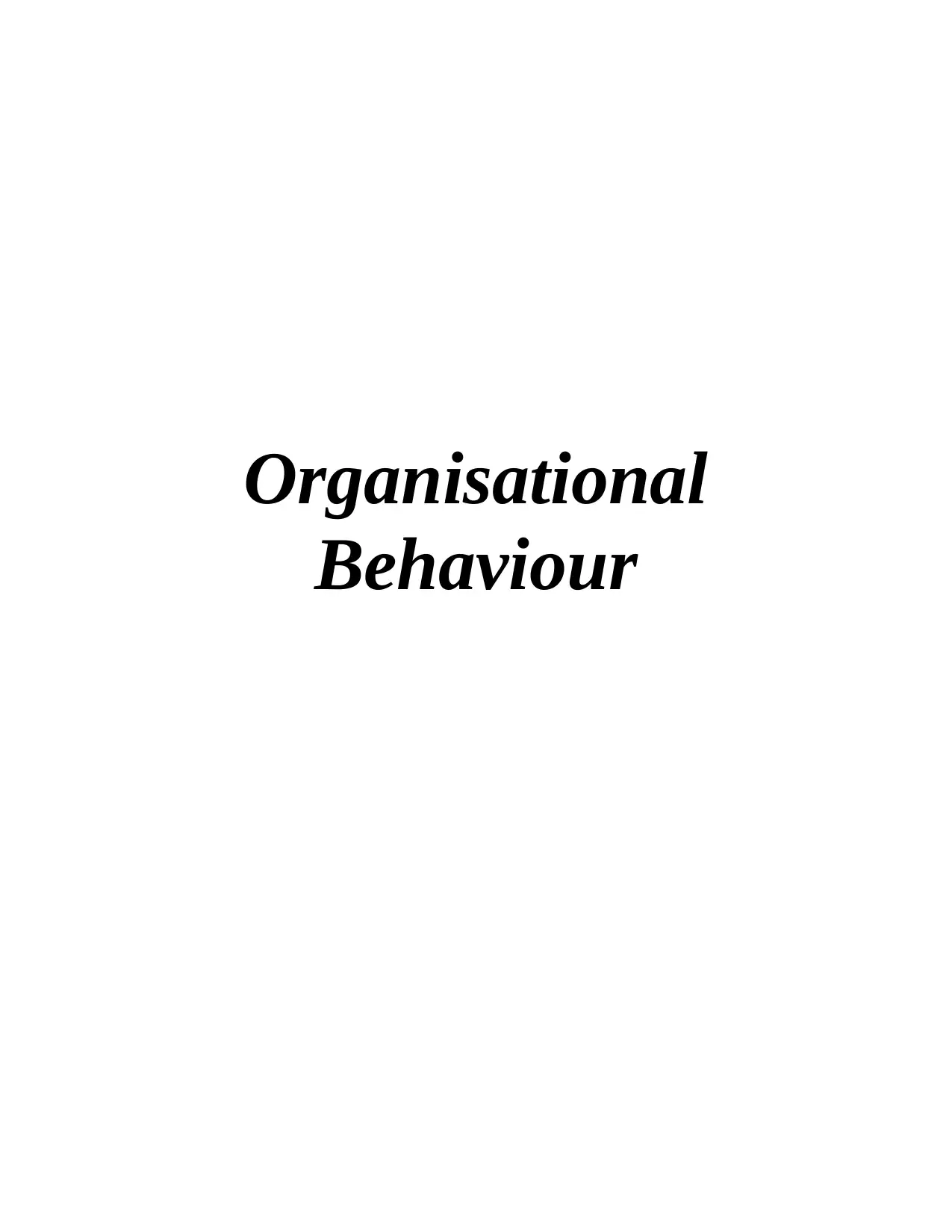
Organisational
Behaviour
Behaviour
Secure Best Marks with AI Grader
Need help grading? Try our AI Grader for instant feedback on your assignments.
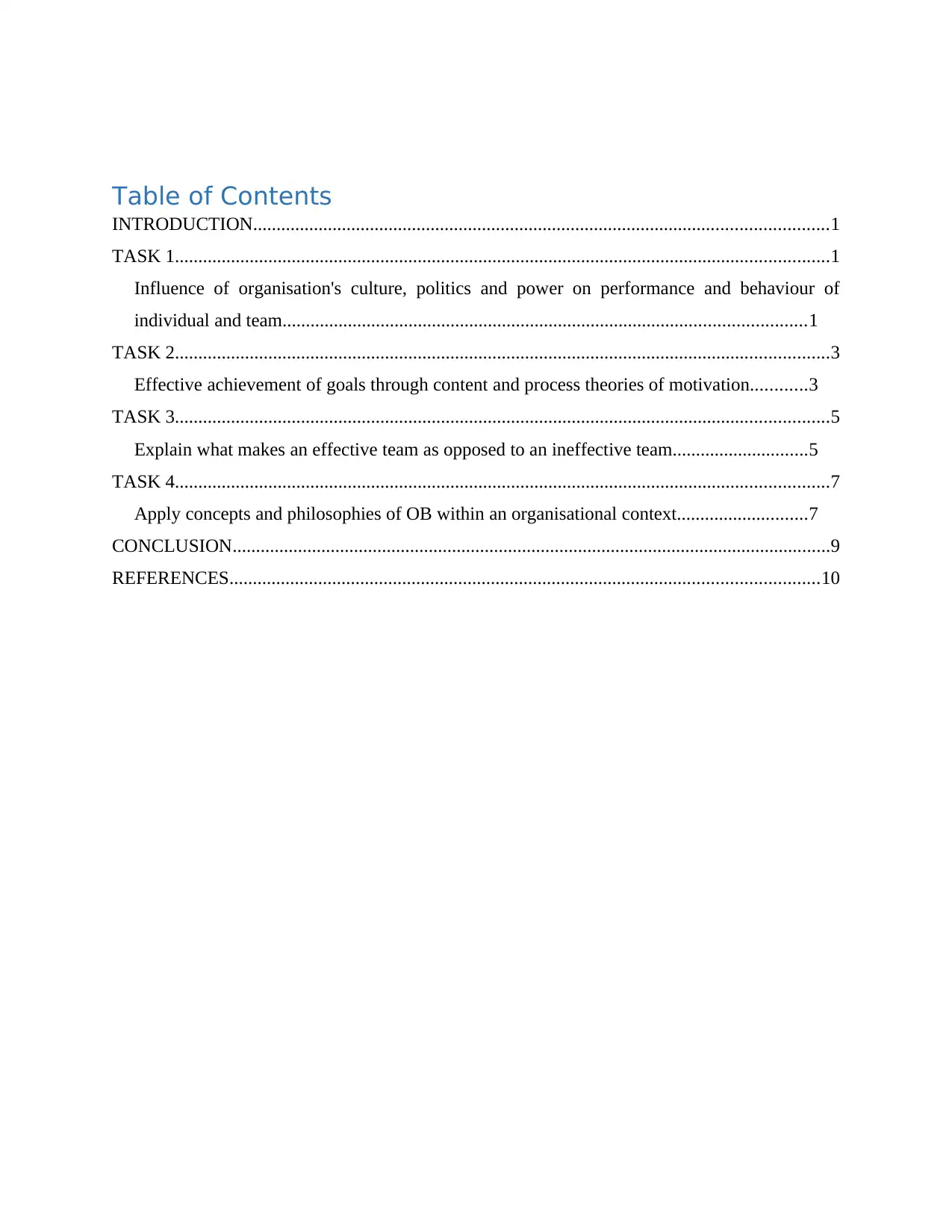
Table of Contents
INTRODUCTION...........................................................................................................................1
TASK 1............................................................................................................................................1
Influence of organisation's culture, politics and power on performance and behaviour of
individual and team................................................................................................................1
TASK 2............................................................................................................................................3
Effective achievement of goals through content and process theories of motivation............3
TASK 3............................................................................................................................................5
Explain what makes an effective team as opposed to an ineffective team.............................5
TASK 4............................................................................................................................................7
Apply concepts and philosophies of OB within an organisational context............................7
CONCLUSION................................................................................................................................9
REFERENCES..............................................................................................................................10
INTRODUCTION...........................................................................................................................1
TASK 1............................................................................................................................................1
Influence of organisation's culture, politics and power on performance and behaviour of
individual and team................................................................................................................1
TASK 2............................................................................................................................................3
Effective achievement of goals through content and process theories of motivation............3
TASK 3............................................................................................................................................5
Explain what makes an effective team as opposed to an ineffective team.............................5
TASK 4............................................................................................................................................7
Apply concepts and philosophies of OB within an organisational context............................7
CONCLUSION................................................................................................................................9
REFERENCES..............................................................................................................................10
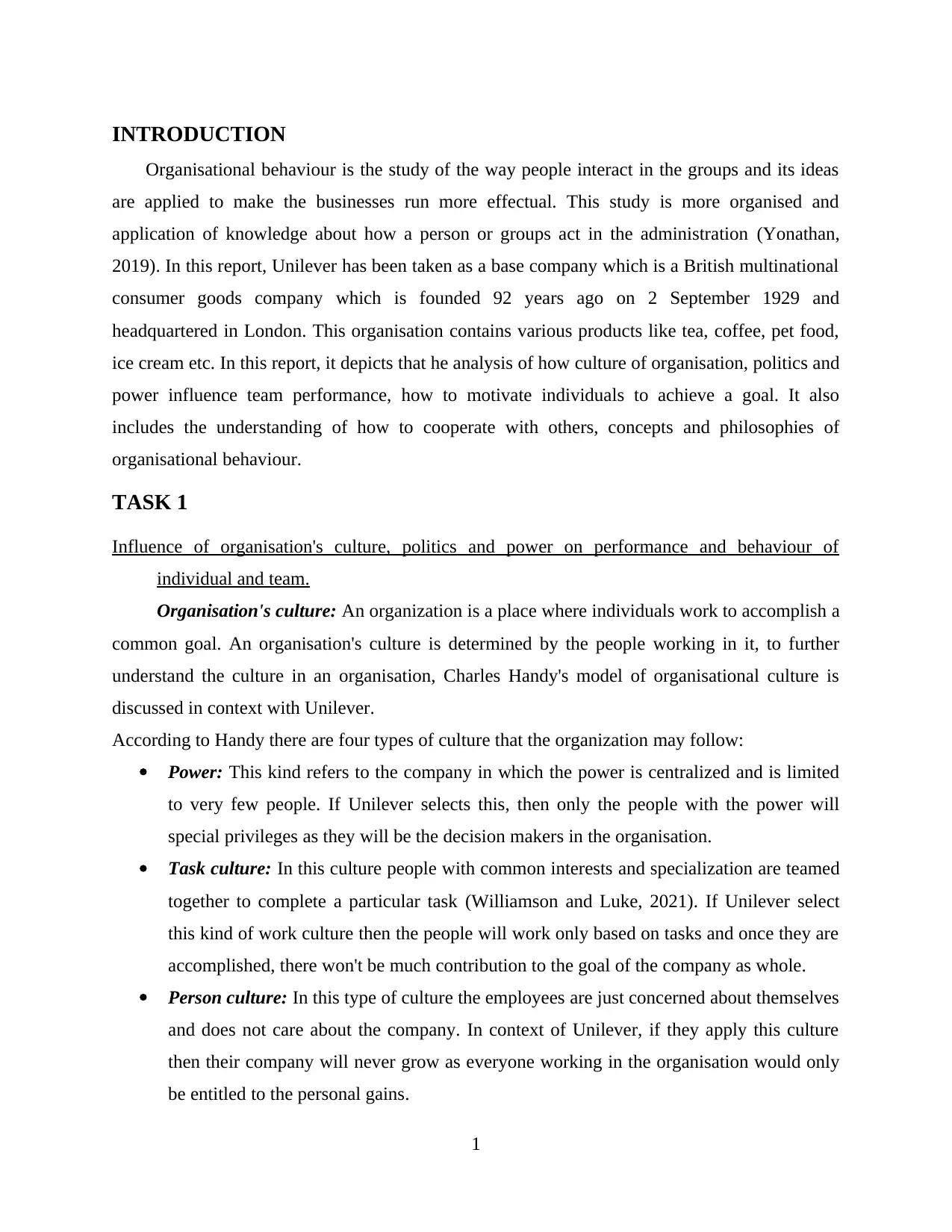
INTRODUCTION
Organisational behaviour is the study of the way people interact in the groups and its ideas
are applied to make the businesses run more effectual. This study is more organised and
application of knowledge about how a person or groups act in the administration (Yonathan,
2019). In this report, Unilever has been taken as a base company which is a British multinational
consumer goods company which is founded 92 years ago on 2 September 1929 and
headquartered in London. This organisation contains various products like tea, coffee, pet food,
ice cream etc. In this report, it depicts that he analysis of how culture of organisation, politics and
power influence team performance, how to motivate individuals to achieve a goal. It also
includes the understanding of how to cooperate with others, concepts and philosophies of
organisational behaviour.
TASK 1
Influence of organisation's culture, politics and power on performance and behaviour of
individual and team.
Organisation's culture: An organization is a place where individuals work to accomplish a
common goal. An organisation's culture is determined by the people working in it, to further
understand the culture in an organisation, Charles Handy's model of organisational culture is
discussed in context with Unilever.
According to Handy there are four types of culture that the organization may follow:
Power: This kind refers to the company in which the power is centralized and is limited
to very few people. If Unilever selects this, then only the people with the power will
special privileges as they will be the decision makers in the organisation.
Task culture: In this culture people with common interests and specialization are teamed
together to complete a particular task (Williamson and Luke, 2021). If Unilever select
this kind of work culture then the people will work only based on tasks and once they are
accomplished, there won't be much contribution to the goal of the company as whole.
Person culture: In this type of culture the employees are just concerned about themselves
and does not care about the company. In context of Unilever, if they apply this culture
then their company will never grow as everyone working in the organisation would only
be entitled to the personal gains.
1
Organisational behaviour is the study of the way people interact in the groups and its ideas
are applied to make the businesses run more effectual. This study is more organised and
application of knowledge about how a person or groups act in the administration (Yonathan,
2019). In this report, Unilever has been taken as a base company which is a British multinational
consumer goods company which is founded 92 years ago on 2 September 1929 and
headquartered in London. This organisation contains various products like tea, coffee, pet food,
ice cream etc. In this report, it depicts that he analysis of how culture of organisation, politics and
power influence team performance, how to motivate individuals to achieve a goal. It also
includes the understanding of how to cooperate with others, concepts and philosophies of
organisational behaviour.
TASK 1
Influence of organisation's culture, politics and power on performance and behaviour of
individual and team.
Organisation's culture: An organization is a place where individuals work to accomplish a
common goal. An organisation's culture is determined by the people working in it, to further
understand the culture in an organisation, Charles Handy's model of organisational culture is
discussed in context with Unilever.
According to Handy there are four types of culture that the organization may follow:
Power: This kind refers to the company in which the power is centralized and is limited
to very few people. If Unilever selects this, then only the people with the power will
special privileges as they will be the decision makers in the organisation.
Task culture: In this culture people with common interests and specialization are teamed
together to complete a particular task (Williamson and Luke, 2021). If Unilever select
this kind of work culture then the people will work only based on tasks and once they are
accomplished, there won't be much contribution to the goal of the company as whole.
Person culture: In this type of culture the employees are just concerned about themselves
and does not care about the company. In context of Unilever, if they apply this culture
then their company will never grow as everyone working in the organisation would only
be entitled to the personal gains.
1
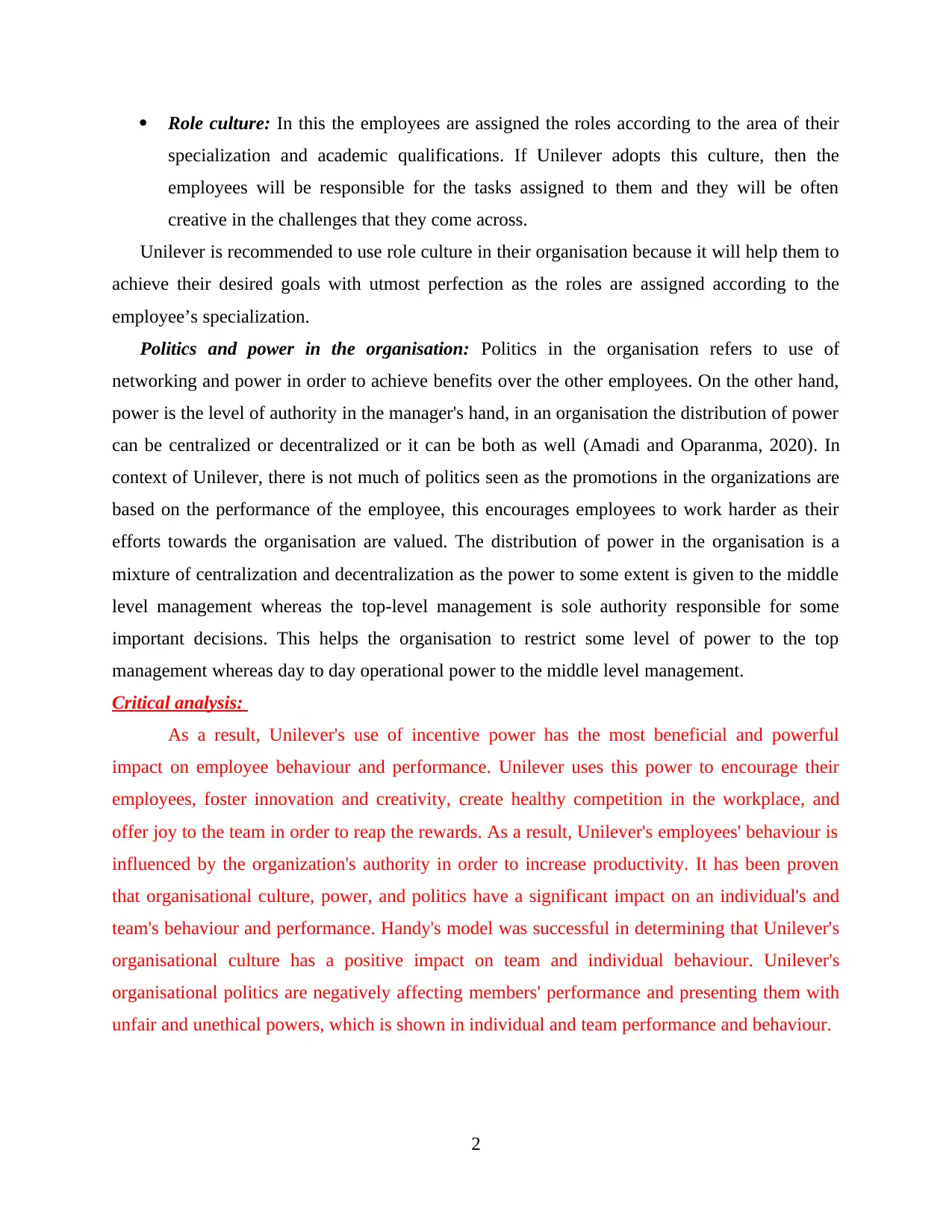
Role culture: In this the employees are assigned the roles according to the area of their
specialization and academic qualifications. If Unilever adopts this culture, then the
employees will be responsible for the tasks assigned to them and they will be often
creative in the challenges that they come across.
Unilever is recommended to use role culture in their organisation because it will help them to
achieve their desired goals with utmost perfection as the roles are assigned according to the
employee’s specialization.
Politics and power in the organisation: Politics in the organisation refers to use of
networking and power in order to achieve benefits over the other employees. On the other hand,
power is the level of authority in the manager's hand, in an organisation the distribution of power
can be centralized or decentralized or it can be both as well (Amadi and Oparanma, 2020). In
context of Unilever, there is not much of politics seen as the promotions in the organizations are
based on the performance of the employee, this encourages employees to work harder as their
efforts towards the organisation are valued. The distribution of power in the organisation is a
mixture of centralization and decentralization as the power to some extent is given to the middle
level management whereas the top-level management is sole authority responsible for some
important decisions. This helps the organisation to restrict some level of power to the top
management whereas day to day operational power to the middle level management.
Critical analysis:
As a result, Unilever's use of incentive power has the most beneficial and powerful
impact on employee behaviour and performance. Unilever uses this power to encourage their
employees, foster innovation and creativity, create healthy competition in the workplace, and
offer joy to the team in order to reap the rewards. As a result, Unilever's employees' behaviour is
influenced by the organization's authority in order to increase productivity. It has been proven
that organisational culture, power, and politics have a significant impact on an individual's and
team's behaviour and performance. Handy's model was successful in determining that Unilever's
organisational culture has a positive impact on team and individual behaviour. Unilever's
organisational politics are negatively affecting members' performance and presenting them with
unfair and unethical powers, which is shown in individual and team performance and behaviour.
2
specialization and academic qualifications. If Unilever adopts this culture, then the
employees will be responsible for the tasks assigned to them and they will be often
creative in the challenges that they come across.
Unilever is recommended to use role culture in their organisation because it will help them to
achieve their desired goals with utmost perfection as the roles are assigned according to the
employee’s specialization.
Politics and power in the organisation: Politics in the organisation refers to use of
networking and power in order to achieve benefits over the other employees. On the other hand,
power is the level of authority in the manager's hand, in an organisation the distribution of power
can be centralized or decentralized or it can be both as well (Amadi and Oparanma, 2020). In
context of Unilever, there is not much of politics seen as the promotions in the organizations are
based on the performance of the employee, this encourages employees to work harder as their
efforts towards the organisation are valued. The distribution of power in the organisation is a
mixture of centralization and decentralization as the power to some extent is given to the middle
level management whereas the top-level management is sole authority responsible for some
important decisions. This helps the organisation to restrict some level of power to the top
management whereas day to day operational power to the middle level management.
Critical analysis:
As a result, Unilever's use of incentive power has the most beneficial and powerful
impact on employee behaviour and performance. Unilever uses this power to encourage their
employees, foster innovation and creativity, create healthy competition in the workplace, and
offer joy to the team in order to reap the rewards. As a result, Unilever's employees' behaviour is
influenced by the organization's authority in order to increase productivity. It has been proven
that organisational culture, power, and politics have a significant impact on an individual's and
team's behaviour and performance. Handy's model was successful in determining that Unilever's
organisational culture has a positive impact on team and individual behaviour. Unilever's
organisational politics are negatively affecting members' performance and presenting them with
unfair and unethical powers, which is shown in individual and team performance and behaviour.
2
Secure Best Marks with AI Grader
Need help grading? Try our AI Grader for instant feedback on your assignments.
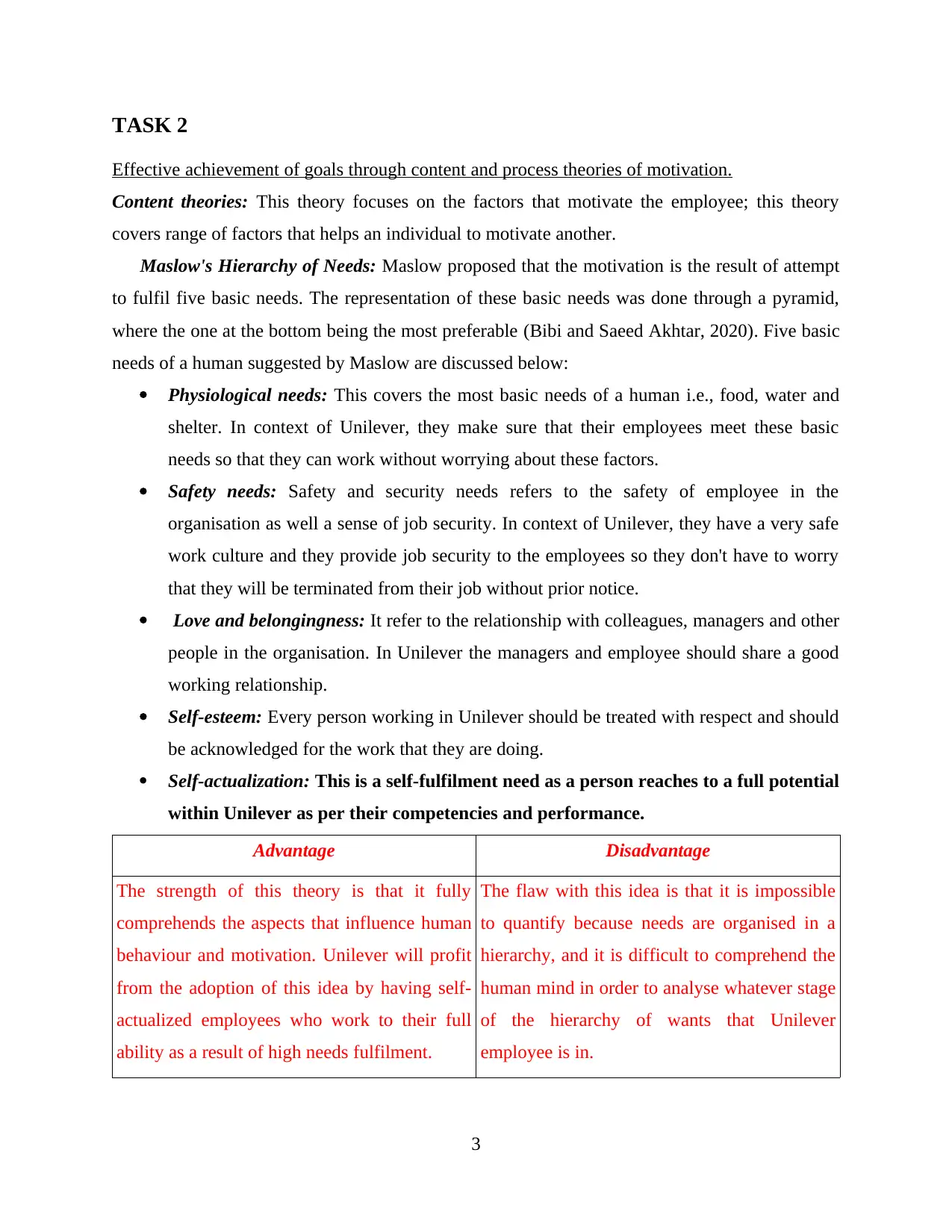
TASK 2
Effective achievement of goals through content and process theories of motivation.
Content theories: This theory focuses on the factors that motivate the employee; this theory
covers range of factors that helps an individual to motivate another.
Maslow's Hierarchy of Needs: Maslow proposed that the motivation is the result of attempt
to fulfil five basic needs. The representation of these basic needs was done through a pyramid,
where the one at the bottom being the most preferable (Bibi and Saeed Akhtar, 2020). Five basic
needs of a human suggested by Maslow are discussed below:
Physiological needs: This covers the most basic needs of a human i.e., food, water and
shelter. In context of Unilever, they make sure that their employees meet these basic
needs so that they can work without worrying about these factors.
Safety needs: Safety and security needs refers to the safety of employee in the
organisation as well a sense of job security. In context of Unilever, they have a very safe
work culture and they provide job security to the employees so they don't have to worry
that they will be terminated from their job without prior notice.
Love and belongingness: It refer to the relationship with colleagues, managers and other
people in the organisation. In Unilever the managers and employee should share a good
working relationship.
Self-esteem: Every person working in Unilever should be treated with respect and should
be acknowledged for the work that they are doing.
Self-actualization: This is a self-fulfilment need as a person reaches to a full potential
within Unilever as per their competencies and performance.
Advantage Disadvantage
The strength of this theory is that it fully
comprehends the aspects that influence human
behaviour and motivation. Unilever will profit
from the adoption of this idea by having self-
actualized employees who work to their full
ability as a result of high needs fulfilment.
The flaw with this idea is that it is impossible
to quantify because needs are organised in a
hierarchy, and it is difficult to comprehend the
human mind in order to analyse whatever stage
of the hierarchy of wants that Unilever
employee is in.
3
Effective achievement of goals through content and process theories of motivation.
Content theories: This theory focuses on the factors that motivate the employee; this theory
covers range of factors that helps an individual to motivate another.
Maslow's Hierarchy of Needs: Maslow proposed that the motivation is the result of attempt
to fulfil five basic needs. The representation of these basic needs was done through a pyramid,
where the one at the bottom being the most preferable (Bibi and Saeed Akhtar, 2020). Five basic
needs of a human suggested by Maslow are discussed below:
Physiological needs: This covers the most basic needs of a human i.e., food, water and
shelter. In context of Unilever, they make sure that their employees meet these basic
needs so that they can work without worrying about these factors.
Safety needs: Safety and security needs refers to the safety of employee in the
organisation as well a sense of job security. In context of Unilever, they have a very safe
work culture and they provide job security to the employees so they don't have to worry
that they will be terminated from their job without prior notice.
Love and belongingness: It refer to the relationship with colleagues, managers and other
people in the organisation. In Unilever the managers and employee should share a good
working relationship.
Self-esteem: Every person working in Unilever should be treated with respect and should
be acknowledged for the work that they are doing.
Self-actualization: This is a self-fulfilment need as a person reaches to a full potential
within Unilever as per their competencies and performance.
Advantage Disadvantage
The strength of this theory is that it fully
comprehends the aspects that influence human
behaviour and motivation. Unilever will profit
from the adoption of this idea by having self-
actualized employees who work to their full
ability as a result of high needs fulfilment.
The flaw with this idea is that it is impossible
to quantify because needs are organised in a
hierarchy, and it is difficult to comprehend the
human mind in order to analyse whatever stage
of the hierarchy of wants that Unilever
employee is in.
3
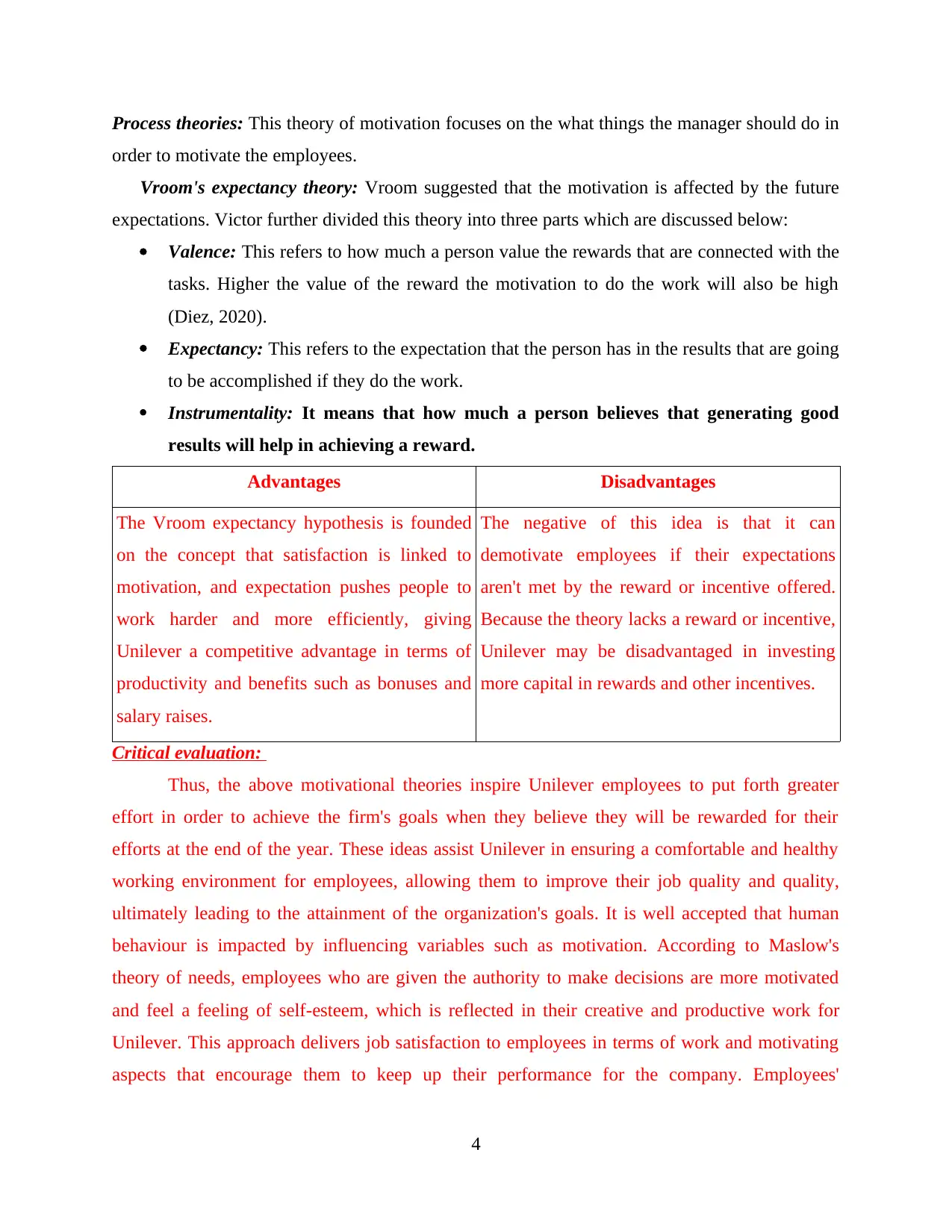
Process theories: This theory of motivation focuses on the what things the manager should do in
order to motivate the employees.
Vroom's expectancy theory: Vroom suggested that the motivation is affected by the future
expectations. Victor further divided this theory into three parts which are discussed below:
Valence: This refers to how much a person value the rewards that are connected with the
tasks. Higher the value of the reward the motivation to do the work will also be high
(Diez, 2020).
Expectancy: This refers to the expectation that the person has in the results that are going
to be accomplished if they do the work.
Instrumentality: It means that how much a person believes that generating good
results will help in achieving a reward.
Advantages Disadvantages
The Vroom expectancy hypothesis is founded
on the concept that satisfaction is linked to
motivation, and expectation pushes people to
work harder and more efficiently, giving
Unilever a competitive advantage in terms of
productivity and benefits such as bonuses and
salary raises.
The negative of this idea is that it can
demotivate employees if their expectations
aren't met by the reward or incentive offered.
Because the theory lacks a reward or incentive,
Unilever may be disadvantaged in investing
more capital in rewards and other incentives.
Critical evaluation:
Thus, the above motivational theories inspire Unilever employees to put forth greater
effort in order to achieve the firm's goals when they believe they will be rewarded for their
efforts at the end of the year. These ideas assist Unilever in ensuring a comfortable and healthy
working environment for employees, allowing them to improve their job quality and quality,
ultimately leading to the attainment of the organization's goals. It is well accepted that human
behaviour is impacted by influencing variables such as motivation. According to Maslow's
theory of needs, employees who are given the authority to make decisions are more motivated
and feel a feeling of self-esteem, which is reflected in their creative and productive work for
Unilever. This approach delivers job satisfaction to employees in terms of work and motivating
aspects that encourage them to keep up their performance for the company. Employees'
4
order to motivate the employees.
Vroom's expectancy theory: Vroom suggested that the motivation is affected by the future
expectations. Victor further divided this theory into three parts which are discussed below:
Valence: This refers to how much a person value the rewards that are connected with the
tasks. Higher the value of the reward the motivation to do the work will also be high
(Diez, 2020).
Expectancy: This refers to the expectation that the person has in the results that are going
to be accomplished if they do the work.
Instrumentality: It means that how much a person believes that generating good
results will help in achieving a reward.
Advantages Disadvantages
The Vroom expectancy hypothesis is founded
on the concept that satisfaction is linked to
motivation, and expectation pushes people to
work harder and more efficiently, giving
Unilever a competitive advantage in terms of
productivity and benefits such as bonuses and
salary raises.
The negative of this idea is that it can
demotivate employees if their expectations
aren't met by the reward or incentive offered.
Because the theory lacks a reward or incentive,
Unilever may be disadvantaged in investing
more capital in rewards and other incentives.
Critical evaluation:
Thus, the above motivational theories inspire Unilever employees to put forth greater
effort in order to achieve the firm's goals when they believe they will be rewarded for their
efforts at the end of the year. These ideas assist Unilever in ensuring a comfortable and healthy
working environment for employees, allowing them to improve their job quality and quality,
ultimately leading to the attainment of the organization's goals. It is well accepted that human
behaviour is impacted by influencing variables such as motivation. According to Maslow's
theory of needs, employees who are given the authority to make decisions are more motivated
and feel a feeling of self-esteem, which is reflected in their creative and productive work for
Unilever. This approach delivers job satisfaction to employees in terms of work and motivating
aspects that encourage them to keep up their performance for the company. Employees'
4
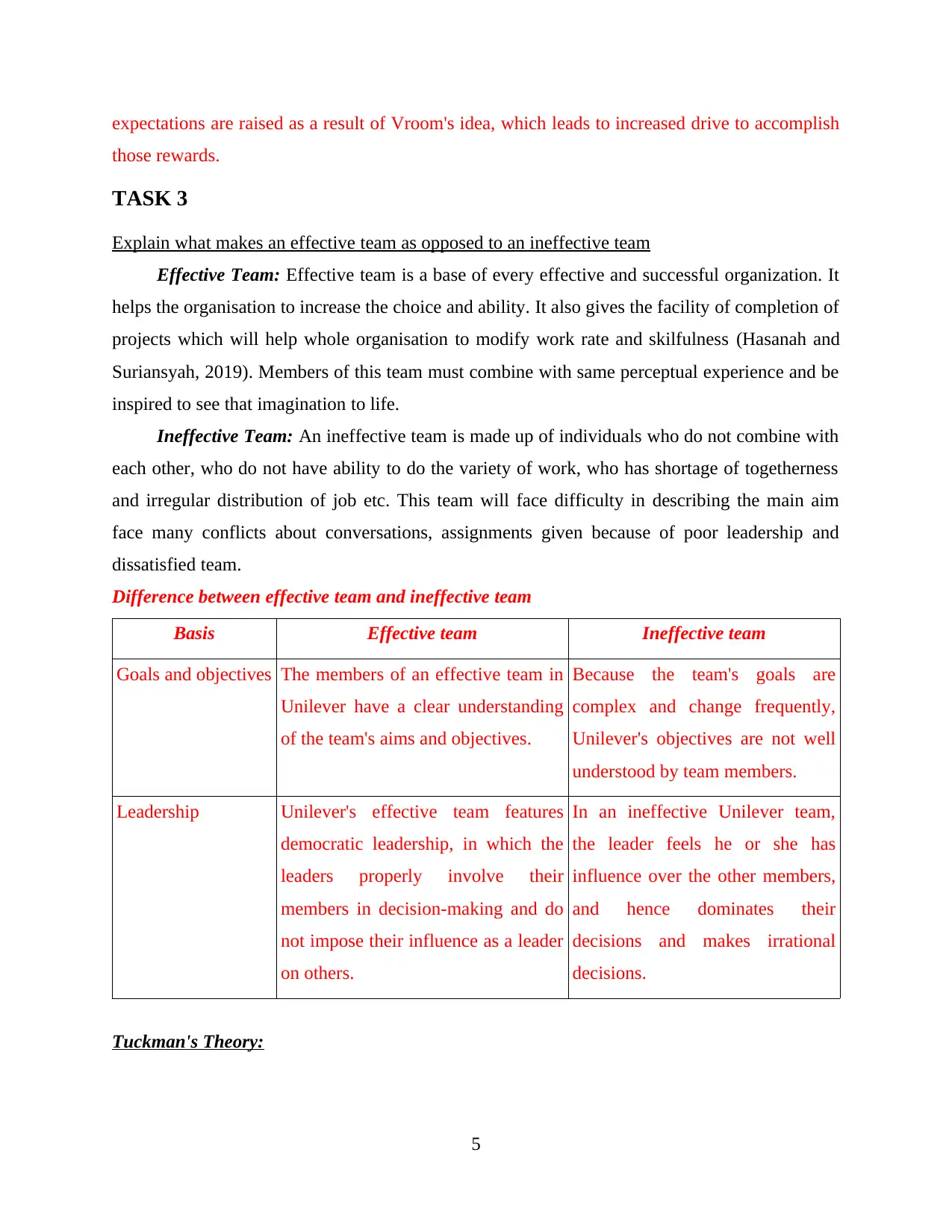
expectations are raised as a result of Vroom's idea, which leads to increased drive to accomplish
those rewards.
TASK 3
Explain what makes an effective team as opposed to an ineffective team
Effective Team: Effective team is a base of every effective and successful organization. It
helps the organisation to increase the choice and ability. It also gives the facility of completion of
projects which will help whole organisation to modify work rate and skilfulness (Hasanah and
Suriansyah, 2019). Members of this team must combine with same perceptual experience and be
inspired to see that imagination to life.
Ineffective Team: An ineffective team is made up of individuals who do not combine with
each other, who do not have ability to do the variety of work, who has shortage of togetherness
and irregular distribution of job etc. This team will face difficulty in describing the main aim
face many conflicts about conversations, assignments given because of poor leadership and
dissatisfied team.
Difference between effective team and ineffective team
Basis Effective team Ineffective team
Goals and objectives The members of an effective team in
Unilever have a clear understanding
of the team's aims and objectives.
Because the team's goals are
complex and change frequently,
Unilever's objectives are not well
understood by team members.
Leadership Unilever's effective team features
democratic leadership, in which the
leaders properly involve their
members in decision-making and do
not impose their influence as a leader
on others.
In an ineffective Unilever team,
the leader feels he or she has
influence over the other members,
and hence dominates their
decisions and makes irrational
decisions.
Tuckman's Theory:
5
those rewards.
TASK 3
Explain what makes an effective team as opposed to an ineffective team
Effective Team: Effective team is a base of every effective and successful organization. It
helps the organisation to increase the choice and ability. It also gives the facility of completion of
projects which will help whole organisation to modify work rate and skilfulness (Hasanah and
Suriansyah, 2019). Members of this team must combine with same perceptual experience and be
inspired to see that imagination to life.
Ineffective Team: An ineffective team is made up of individuals who do not combine with
each other, who do not have ability to do the variety of work, who has shortage of togetherness
and irregular distribution of job etc. This team will face difficulty in describing the main aim
face many conflicts about conversations, assignments given because of poor leadership and
dissatisfied team.
Difference between effective team and ineffective team
Basis Effective team Ineffective team
Goals and objectives The members of an effective team in
Unilever have a clear understanding
of the team's aims and objectives.
Because the team's goals are
complex and change frequently,
Unilever's objectives are not well
understood by team members.
Leadership Unilever's effective team features
democratic leadership, in which the
leaders properly involve their
members in decision-making and do
not impose their influence as a leader
on others.
In an ineffective Unilever team,
the leader feels he or she has
influence over the other members,
and hence dominates their
decisions and makes irrational
decisions.
Tuckman's Theory:
5
Paraphrase This Document
Need a fresh take? Get an instant paraphrase of this document with our AI Paraphraser
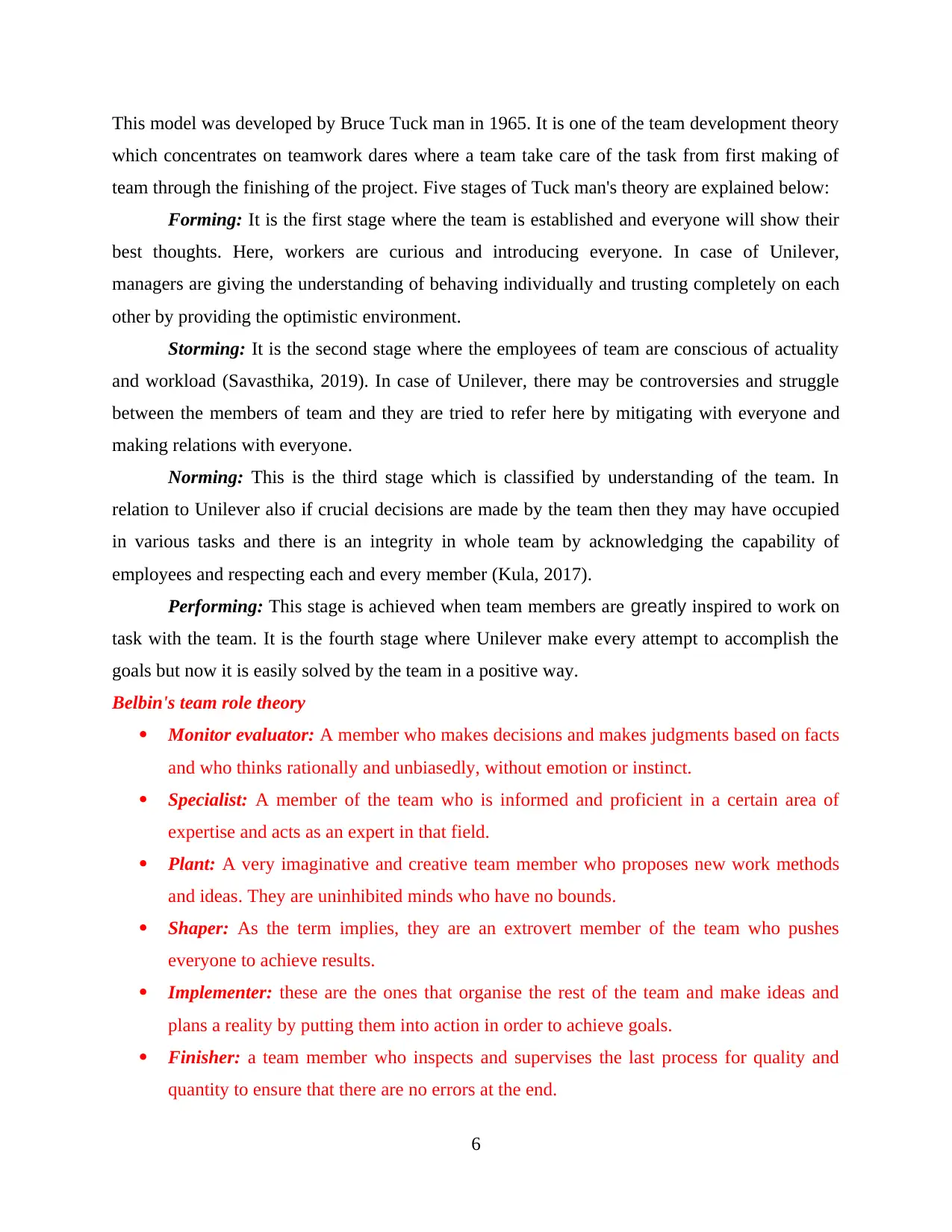
This model was developed by Bruce Tuck man in 1965. It is one of the team development theory
which concentrates on teamwork dares where a team take care of the task from first making of
team through the finishing of the project. Five stages of Tuck man's theory are explained below:
Forming: It is the first stage where the team is established and everyone will show their
best thoughts. Here, workers are curious and introducing everyone. In case of Unilever,
managers are giving the understanding of behaving individually and trusting completely on each
other by providing the optimistic environment.
Storming: It is the second stage where the employees of team are conscious of actuality
and workload (Savasthika, 2019). In case of Unilever, there may be controversies and struggle
between the members of team and they are tried to refer here by mitigating with everyone and
making relations with everyone.
Norming: This is the third stage which is classified by understanding of the team. In
relation to Unilever also if crucial decisions are made by the team then they may have occupied
in various tasks and there is an integrity in whole team by acknowledging the capability of
employees and respecting each and every member (Kula, 2017).
Performing: This stage is achieved when team members are greatly inspired to work on
task with the team. It is the fourth stage where Unilever make every attempt to accomplish the
goals but now it is easily solved by the team in a positive way.
Belbin's team role theory
Monitor evaluator: A member who makes decisions and makes judgments based on facts
and who thinks rationally and unbiasedly, without emotion or instinct.
Specialist: A member of the team who is informed and proficient in a certain area of
expertise and acts as an expert in that field.
Plant: A very imaginative and creative team member who proposes new work methods
and ideas. They are uninhibited minds who have no bounds.
Shaper: As the term implies, they are an extrovert member of the team who pushes
everyone to achieve results.
Implementer: these are the ones that organise the rest of the team and make ideas and
plans a reality by putting them into action in order to achieve goals.
Finisher: a team member who inspects and supervises the last process for quality and
quantity to ensure that there are no errors at the end.
6
which concentrates on teamwork dares where a team take care of the task from first making of
team through the finishing of the project. Five stages of Tuck man's theory are explained below:
Forming: It is the first stage where the team is established and everyone will show their
best thoughts. Here, workers are curious and introducing everyone. In case of Unilever,
managers are giving the understanding of behaving individually and trusting completely on each
other by providing the optimistic environment.
Storming: It is the second stage where the employees of team are conscious of actuality
and workload (Savasthika, 2019). In case of Unilever, there may be controversies and struggle
between the members of team and they are tried to refer here by mitigating with everyone and
making relations with everyone.
Norming: This is the third stage which is classified by understanding of the team. In
relation to Unilever also if crucial decisions are made by the team then they may have occupied
in various tasks and there is an integrity in whole team by acknowledging the capability of
employees and respecting each and every member (Kula, 2017).
Performing: This stage is achieved when team members are greatly inspired to work on
task with the team. It is the fourth stage where Unilever make every attempt to accomplish the
goals but now it is easily solved by the team in a positive way.
Belbin's team role theory
Monitor evaluator: A member who makes decisions and makes judgments based on facts
and who thinks rationally and unbiasedly, without emotion or instinct.
Specialist: A member of the team who is informed and proficient in a certain area of
expertise and acts as an expert in that field.
Plant: A very imaginative and creative team member who proposes new work methods
and ideas. They are uninhibited minds who have no bounds.
Shaper: As the term implies, they are an extrovert member of the team who pushes
everyone to achieve results.
Implementer: these are the ones that organise the rest of the team and make ideas and
plans a reality by putting them into action in order to achieve goals.
Finisher: a team member who inspects and supervises the last process for quality and
quantity to ensure that there are no errors at the end.
6
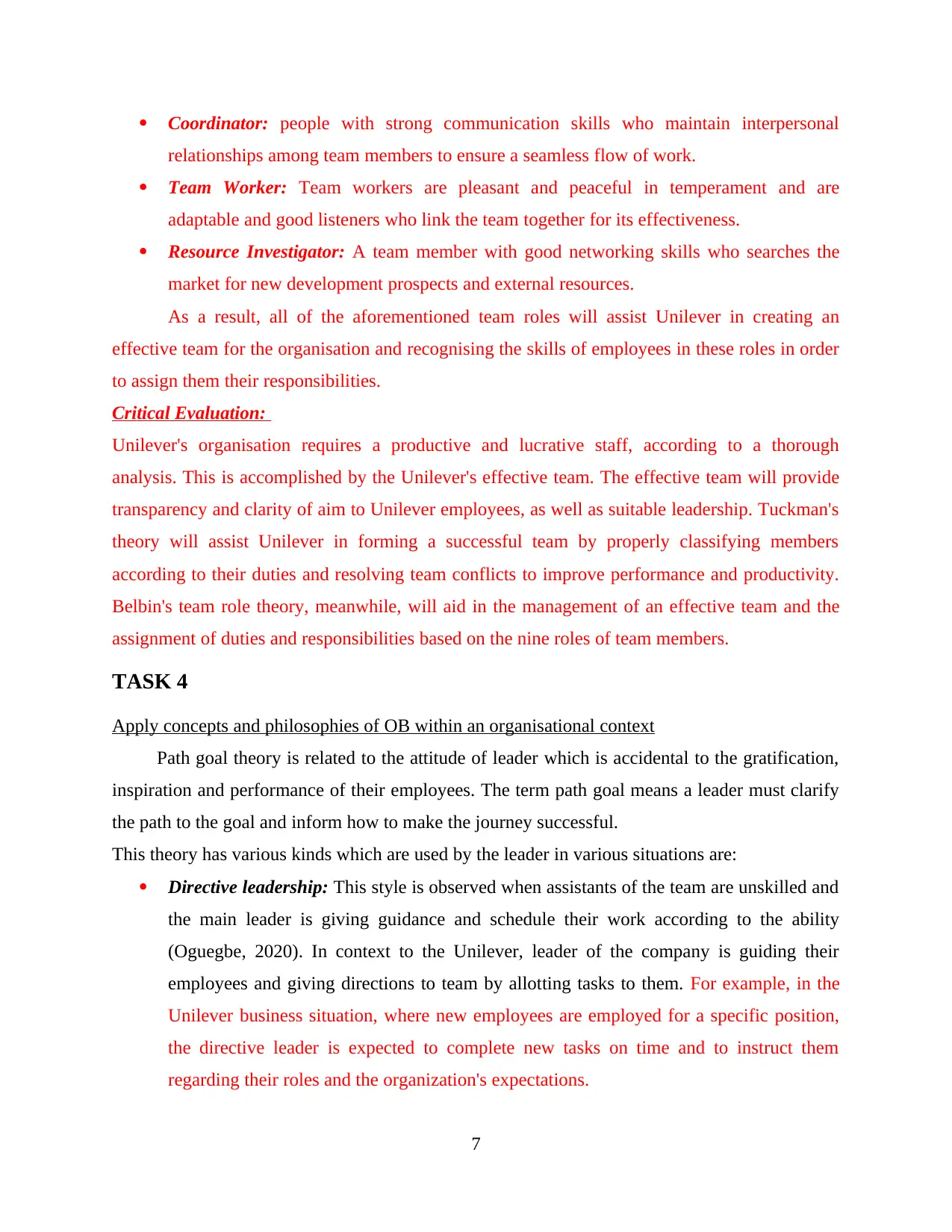
Coordinator: people with strong communication skills who maintain interpersonal
relationships among team members to ensure a seamless flow of work.
Team Worker: Team workers are pleasant and peaceful in temperament and are
adaptable and good listeners who link the team together for its effectiveness.
Resource Investigator: A team member with good networking skills who searches the
market for new development prospects and external resources.
As a result, all of the aforementioned team roles will assist Unilever in creating an
effective team for the organisation and recognising the skills of employees in these roles in order
to assign them their responsibilities.
Critical Evaluation:
Unilever's organisation requires a productive and lucrative staff, according to a thorough
analysis. This is accomplished by the Unilever's effective team. The effective team will provide
transparency and clarity of aim to Unilever employees, as well as suitable leadership. Tuckman's
theory will assist Unilever in forming a successful team by properly classifying members
according to their duties and resolving team conflicts to improve performance and productivity.
Belbin's team role theory, meanwhile, will aid in the management of an effective team and the
assignment of duties and responsibilities based on the nine roles of team members.
TASK 4
Apply concepts and philosophies of OB within an organisational context
Path goal theory is related to the attitude of leader which is accidental to the gratification,
inspiration and performance of their employees. The term path goal means a leader must clarify
the path to the goal and inform how to make the journey successful.
This theory has various kinds which are used by the leader in various situations are:
Directive leadership: This style is observed when assistants of the team are unskilled and
the main leader is giving guidance and schedule their work according to the ability
(Oguegbe, 2020). In context to the Unilever, leader of the company is guiding their
employees and giving directions to team by allotting tasks to them. For example, in the
Unilever business situation, where new employees are employed for a specific position,
the directive leader is expected to complete new tasks on time and to instruct them
regarding their roles and the organization's expectations.
7
relationships among team members to ensure a seamless flow of work.
Team Worker: Team workers are pleasant and peaceful in temperament and are
adaptable and good listeners who link the team together for its effectiveness.
Resource Investigator: A team member with good networking skills who searches the
market for new development prospects and external resources.
As a result, all of the aforementioned team roles will assist Unilever in creating an
effective team for the organisation and recognising the skills of employees in these roles in order
to assign them their responsibilities.
Critical Evaluation:
Unilever's organisation requires a productive and lucrative staff, according to a thorough
analysis. This is accomplished by the Unilever's effective team. The effective team will provide
transparency and clarity of aim to Unilever employees, as well as suitable leadership. Tuckman's
theory will assist Unilever in forming a successful team by properly classifying members
according to their duties and resolving team conflicts to improve performance and productivity.
Belbin's team role theory, meanwhile, will aid in the management of an effective team and the
assignment of duties and responsibilities based on the nine roles of team members.
TASK 4
Apply concepts and philosophies of OB within an organisational context
Path goal theory is related to the attitude of leader which is accidental to the gratification,
inspiration and performance of their employees. The term path goal means a leader must clarify
the path to the goal and inform how to make the journey successful.
This theory has various kinds which are used by the leader in various situations are:
Directive leadership: This style is observed when assistants of the team are unskilled and
the main leader is giving guidance and schedule their work according to the ability
(Oguegbe, 2020). In context to the Unilever, leader of the company is guiding their
employees and giving directions to team by allotting tasks to them. For example, in the
Unilever business situation, where new employees are employed for a specific position,
the directive leader is expected to complete new tasks on time and to instruct them
regarding their roles and the organization's expectations.
7

Participative leadership: This leader always refers with other assistant employees,
consult with the followers before making any decision. In case of Unilever, employees
are highly trained and involved in their work so they all are experts in giving their input
in the decision-making process. For example, if employees at Unilever have poor self-
esteem, a participatory leader will allow them to participate in the decision-making
process, which will help them feel valued and engaged in the organisation, motivating
others to perform productively.
Supportive leadership: This leader is very friendly and concerned with the employee’s
welfare and treat all the members equally. In relation with the Unilever, leader is very
supportable with all the employees and initiated interpersonal relationships with the
employees and make the environment more interesting when work is more stressful
(SANDAMALI and ANJALA, 2019). When a difficult assignment is presented to an
employee at Unilever, for example, the supportive leader may assist their subordinate in
completing the task by leading and directing them to avoid an overburdened workload
and work frustration.
Achievement oriented leadership: These leaders set goals and expect from their
employees to perform at a greater level. In case of Unilever, these leaders encourage
employees and show confidence in them to prove their ability which is very important for
a leader. For example, when situations are difficult at Unilever and targets are more
complex and vaguer, achievement-oriented leaders are responsible for assisting
subordinates in discovering their hidden skills through a rewards and recognition strategy
and leveraging confidence in individual's capability to meet targets.
Social capital theory: This theory is regarded as a factor that contributes to the growth of
human capital through notable resources provided by the top authority, through which employees
can improve and apply their abilities for the advancement of the organization. In terms of
Unilever, they can implement and apply social capital theory, which emphasizes the importance
of human resources and operations in allocating resources and advancing the organization.
Contingency approach: To achieve the goal, the directors and leaders use a methodical
procedure. Due to unforeseen events, managers urge leaders to adapt their management and
leadership styles in order for the organisation to attain effective success.
8
consult with the followers before making any decision. In case of Unilever, employees
are highly trained and involved in their work so they all are experts in giving their input
in the decision-making process. For example, if employees at Unilever have poor self-
esteem, a participatory leader will allow them to participate in the decision-making
process, which will help them feel valued and engaged in the organisation, motivating
others to perform productively.
Supportive leadership: This leader is very friendly and concerned with the employee’s
welfare and treat all the members equally. In relation with the Unilever, leader is very
supportable with all the employees and initiated interpersonal relationships with the
employees and make the environment more interesting when work is more stressful
(SANDAMALI and ANJALA, 2019). When a difficult assignment is presented to an
employee at Unilever, for example, the supportive leader may assist their subordinate in
completing the task by leading and directing them to avoid an overburdened workload
and work frustration.
Achievement oriented leadership: These leaders set goals and expect from their
employees to perform at a greater level. In case of Unilever, these leaders encourage
employees and show confidence in them to prove their ability which is very important for
a leader. For example, when situations are difficult at Unilever and targets are more
complex and vaguer, achievement-oriented leaders are responsible for assisting
subordinates in discovering their hidden skills through a rewards and recognition strategy
and leveraging confidence in individual's capability to meet targets.
Social capital theory: This theory is regarded as a factor that contributes to the growth of
human capital through notable resources provided by the top authority, through which employees
can improve and apply their abilities for the advancement of the organization. In terms of
Unilever, they can implement and apply social capital theory, which emphasizes the importance
of human resources and operations in allocating resources and advancing the organization.
Contingency approach: To achieve the goal, the directors and leaders use a methodical
procedure. Due to unforeseen events, managers urge leaders to adapt their management and
leadership styles in order for the organisation to attain effective success.
8
Secure Best Marks with AI Grader
Need help grading? Try our AI Grader for instant feedback on your assignments.
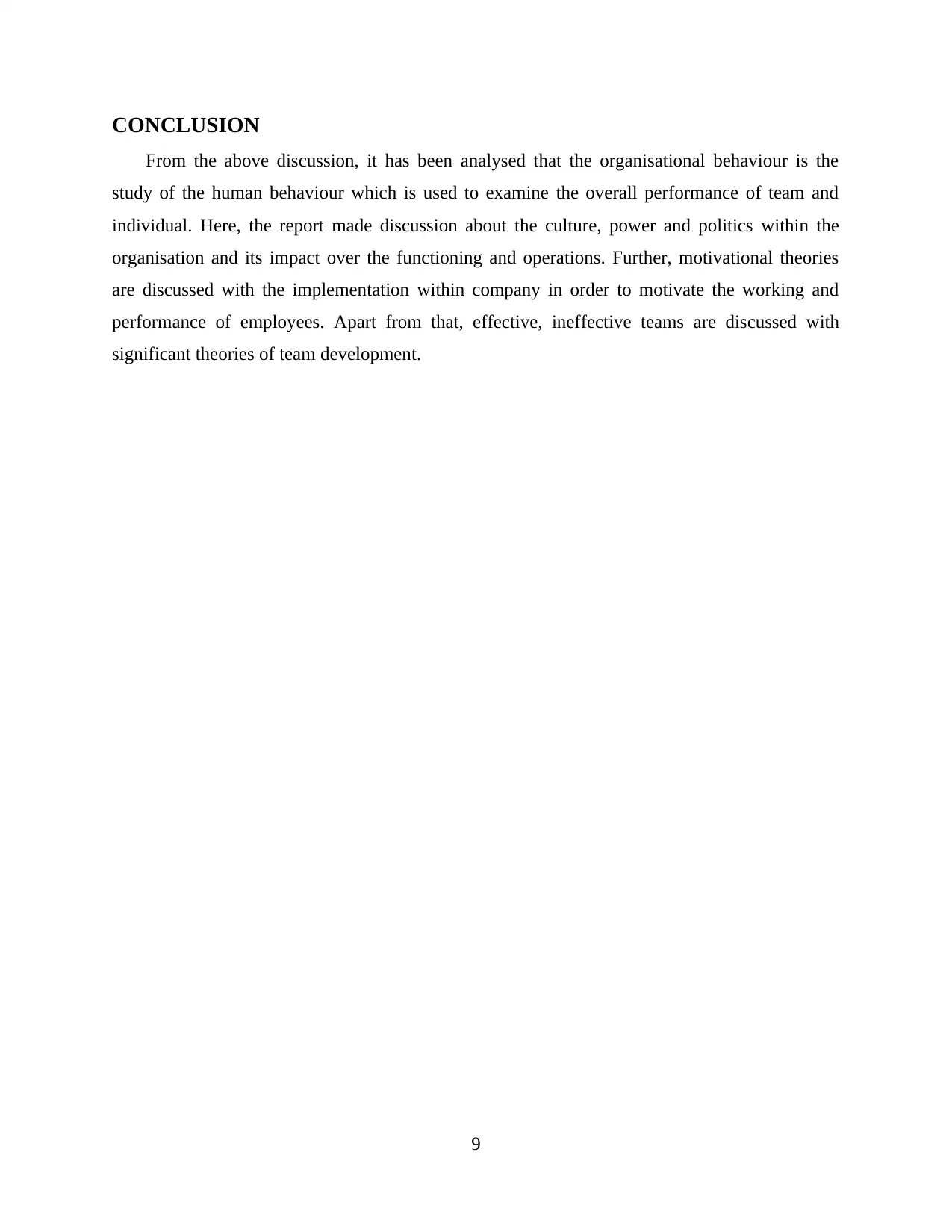
CONCLUSION
From the above discussion, it has been analysed that the organisational behaviour is the
study of the human behaviour which is used to examine the overall performance of team and
individual. Here, the report made discussion about the culture, power and politics within the
organisation and its impact over the functioning and operations. Further, motivational theories
are discussed with the implementation within company in order to motivate the working and
performance of employees. Apart from that, effective, ineffective teams are discussed with
significant theories of team development.
9
From the above discussion, it has been analysed that the organisational behaviour is the
study of the human behaviour which is used to examine the overall performance of team and
individual. Here, the report made discussion about the culture, power and politics within the
organisation and its impact over the functioning and operations. Further, motivational theories
are discussed with the implementation within company in order to motivate the working and
performance of employees. Apart from that, effective, ineffective teams are discussed with
significant theories of team development.
9
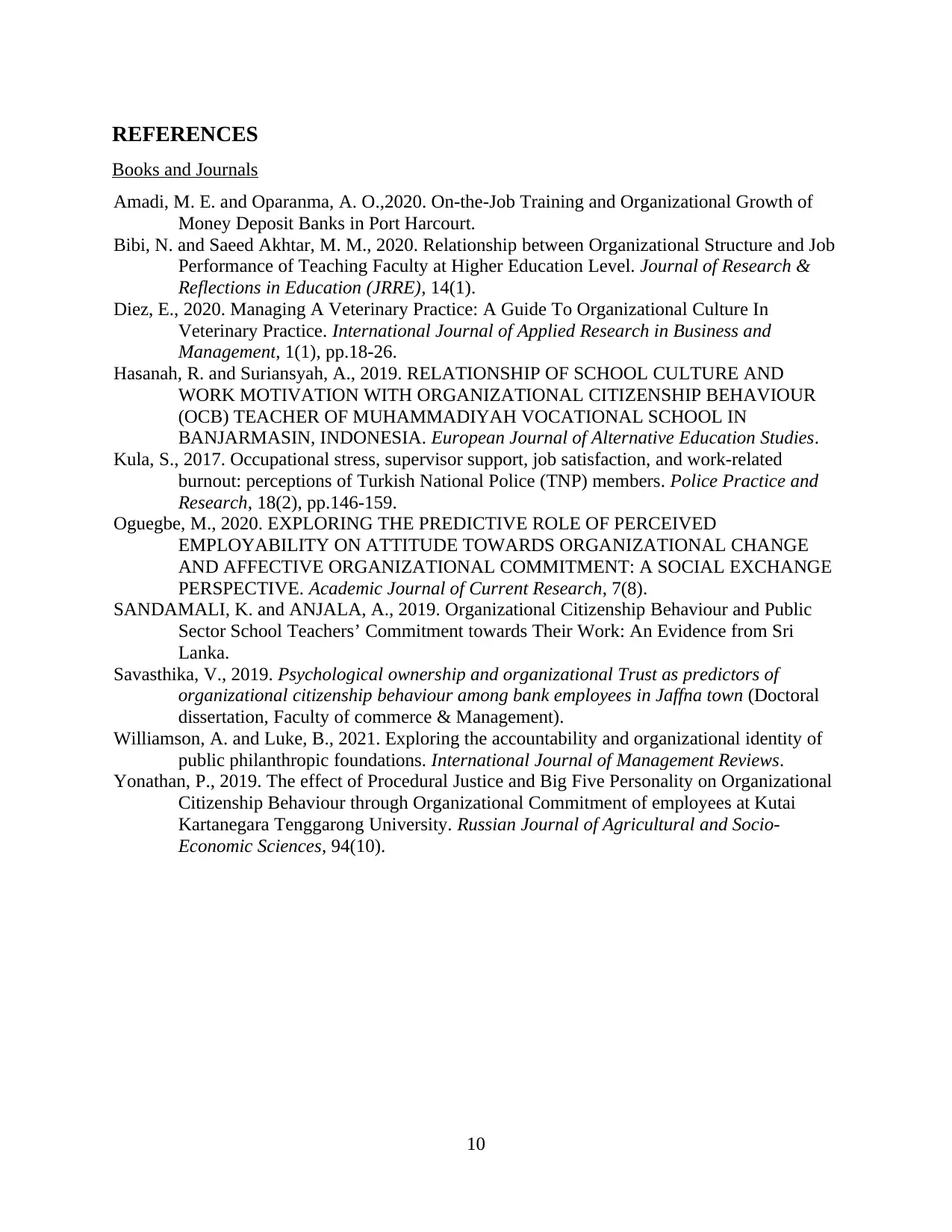
REFERENCES
Books and Journals
Amadi, M. E. and Oparanma, A. O.,2020. On-the-Job Training and Organizational Growth of
Money Deposit Banks in Port Harcourt.
Bibi, N. and Saeed Akhtar, M. M., 2020. Relationship between Organizational Structure and Job
Performance of Teaching Faculty at Higher Education Level. Journal of Research &
Reflections in Education (JRRE), 14(1).
Diez, E., 2020. Managing A Veterinary Practice: A Guide To Organizational Culture In
Veterinary Practice. International Journal of Applied Research in Business and
Management, 1(1), pp.18-26.
Hasanah, R. and Suriansyah, A., 2019. RELATIONSHIP OF SCHOOL CULTURE AND
WORK MOTIVATION WITH ORGANIZATIONAL CITIZENSHIP BEHAVIOUR
(OCB) TEACHER OF MUHAMMADIYAH VOCATIONAL SCHOOL IN
BANJARMASIN, INDONESIA. European Journal of Alternative Education Studies.
Kula, S., 2017. Occupational stress, supervisor support, job satisfaction, and work-related
burnout: perceptions of Turkish National Police (TNP) members. Police Practice and
Research, 18(2), pp.146-159.
Oguegbe, M., 2020. EXPLORING THE PREDICTIVE ROLE OF PERCEIVED
EMPLOYABILITY ON ATTITUDE TOWARDS ORGANIZATIONAL CHANGE
AND AFFECTIVE ORGANIZATIONAL COMMITMENT: A SOCIAL EXCHANGE
PERSPECTIVE. Academic Journal of Current Research, 7(8).
SANDAMALI, K. and ANJALA, A., 2019. Organizational Citizenship Behaviour and Public
Sector School Teachers’ Commitment towards Their Work: An Evidence from Sri
Lanka.
Savasthika, V., 2019. Psychological ownership and organizational Trust as predictors of
organizational citizenship behaviour among bank employees in Jaffna town (Doctoral
dissertation, Faculty of commerce & Management).
Williamson, A. and Luke, B., 2021. Exploring the accountability and organizational identity of
public philanthropic foundations. International Journal of Management Reviews.
Yonathan, P., 2019. The effect of Procedural Justice and Big Five Personality on Organizational
Citizenship Behaviour through Organizational Commitment of employees at Kutai
Kartanegara Tenggarong University. Russian Journal of Agricultural and Socio-
Economic Sciences, 94(10).
10
Books and Journals
Amadi, M. E. and Oparanma, A. O.,2020. On-the-Job Training and Organizational Growth of
Money Deposit Banks in Port Harcourt.
Bibi, N. and Saeed Akhtar, M. M., 2020. Relationship between Organizational Structure and Job
Performance of Teaching Faculty at Higher Education Level. Journal of Research &
Reflections in Education (JRRE), 14(1).
Diez, E., 2020. Managing A Veterinary Practice: A Guide To Organizational Culture In
Veterinary Practice. International Journal of Applied Research in Business and
Management, 1(1), pp.18-26.
Hasanah, R. and Suriansyah, A., 2019. RELATIONSHIP OF SCHOOL CULTURE AND
WORK MOTIVATION WITH ORGANIZATIONAL CITIZENSHIP BEHAVIOUR
(OCB) TEACHER OF MUHAMMADIYAH VOCATIONAL SCHOOL IN
BANJARMASIN, INDONESIA. European Journal of Alternative Education Studies.
Kula, S., 2017. Occupational stress, supervisor support, job satisfaction, and work-related
burnout: perceptions of Turkish National Police (TNP) members. Police Practice and
Research, 18(2), pp.146-159.
Oguegbe, M., 2020. EXPLORING THE PREDICTIVE ROLE OF PERCEIVED
EMPLOYABILITY ON ATTITUDE TOWARDS ORGANIZATIONAL CHANGE
AND AFFECTIVE ORGANIZATIONAL COMMITMENT: A SOCIAL EXCHANGE
PERSPECTIVE. Academic Journal of Current Research, 7(8).
SANDAMALI, K. and ANJALA, A., 2019. Organizational Citizenship Behaviour and Public
Sector School Teachers’ Commitment towards Their Work: An Evidence from Sri
Lanka.
Savasthika, V., 2019. Psychological ownership and organizational Trust as predictors of
organizational citizenship behaviour among bank employees in Jaffna town (Doctoral
dissertation, Faculty of commerce & Management).
Williamson, A. and Luke, B., 2021. Exploring the accountability and organizational identity of
public philanthropic foundations. International Journal of Management Reviews.
Yonathan, P., 2019. The effect of Procedural Justice and Big Five Personality on Organizational
Citizenship Behaviour through Organizational Commitment of employees at Kutai
Kartanegara Tenggarong University. Russian Journal of Agricultural and Socio-
Economic Sciences, 94(10).
10
1 out of 12
Related Documents
Your All-in-One AI-Powered Toolkit for Academic Success.
+13062052269
info@desklib.com
Available 24*7 on WhatsApp / Email
![[object Object]](/_next/static/media/star-bottom.7253800d.svg)
Unlock your academic potential
© 2024 | Zucol Services PVT LTD | All rights reserved.



